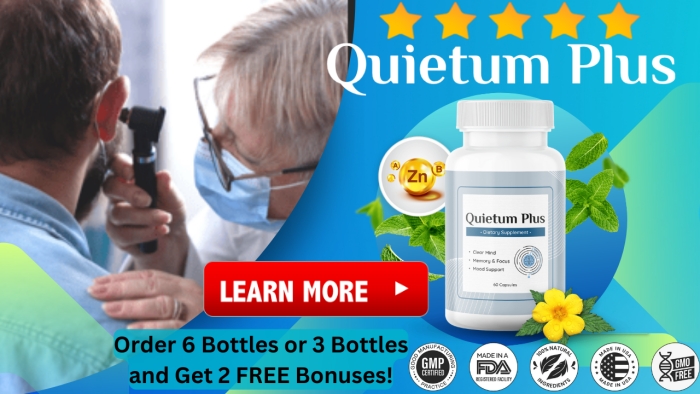I've been meaning to share my thoughts on Quietum Plus, a supplement that's been making waves in our community. Now, I haven't tried it myself, but my neighbor Bob has been using it for a few months, and he's been talking my ear off about it (pun intended!).
For those who don't know, Quietum Plus is supposed to help with tinnitus and overall ear health. Bob's been dealing with that annoying ringing in his ears for years, so he was pretty excited to give this a shot.
Now, I have to be honest - the reviews for Quietum Plus are pretty mixed. Some folks swear by it, while others haven't seen much improvement. Bob falls somewhere in the middle. He says he's noticed a slight reduction in the ringing, but it hasn't been a miracle cure or anything.
One thing that's got me a bit concerned is that some customers have reported stomach upset after taking Quietum Plus. Bob hasn't had this issue, but it's definitely something to keep in mind if you're considering trying it.
I've also come across some complaints about their customer service and return policy. Apparently, some folks have had trouble getting refunds, which is a bit worrying. It's always good to be aware of these things before making a purchase.
On the flip side, the Better Business Bureau profile for Quietum Plus shows that they do offer a money-back guarantee, which is reassuring. Just make sure to read the fine print!
So, what do you all think? Has anyone else here tried Quietum Plus? I'd love to hear about your experiences - good or bad. And if you're considering trying it, what are your thoughts or concerns?
Remember, when it comes to our hearing health, it's always best to consult with a doctor before starting any new supplement regimen. Let's keep the conversation going and support each other in our quest for better hearing!
.
..
.
.
.
.
.
..
..
.
.
.
.
.
.
.
.
.
.
..
.
.
.
.
.
..
..
.
.
.
.
.
.
.
.
.
.
..
.
.
.
.
.
..
..
.
.
.
.
.
.
.
.
.
.
..
.
.
.
.
.
..
..
.
.
.
.
.
.
.
.
.
.
..
.
.
.
.
.
..
..
.
.
.
.
.
.
.
.
.
.
..
.
.
.
.
.
..
..
.
.
.
.
.
.
.
.
.
.
..
.
.
.
.
.
..
..
.
.
.
.
.
.
.
.
.
.
..
.
.
.
.
.
..
..
.
.
.
.
.
.
.
.
.
.
..
.
.
.
.
.
..
..
.
.
.
.
.
.
.
.
.
.
..
.
.
.
.
.
..
..
.
.
.
.
.
.
.
.
.
.
..
.
.
.
.
.
..
..
.
.
.
.
.
.
.
.
.
.
..
.
.
.
.
.
..
..
.
.
.
.
.
.
.
.
.
.
..
.
.
.
.
.
..
..
.
.
.
.
.
.
.
.
.
.
..
.
.
.
.
.
..
..
.
.
.
.
.
.
.
.
.
.
..
.
.
.
.
.
..
..
.
.
.
.
.
.
.
.
.
.
..
.
.
.
.
.
..
..
.
.
.
.
.
.
.
.
.
.
..
.
.
.
.
.
..
..
.
.
.
.
.
.
.
.
.
.
..
.
.
.
.
.
..
..
.
.
.
.
.
.
.
.
.
.
..
.
.
.
.
.
..
..
.
.
.
.
.
.
.
.
.
.
..
.
.
.
.
.
..
..
.
.
.
.
.
.
.
.
.
.
..
.
.
.
.
.
..
..
.
.
.
.
.
.
.
.
.
.
..
.
.
.
.
.
..
..
.
.
.
.
.
.
.
.
.
.
..
.
.
.
.
.
..
..
.
.
.
.
.
.
.
.
.
.
..
.
.
.
.
.
..
..
.
.
.
.
.
.
.
.
.
.
..
.
.
.
.
.
..
..
.
.
.
.
.
.
.
.
.
.
..
.
.
.
.
.
..
..
.
.
.
.
.
.
.
.
.
For those who don't know, Quietum Plus is supposed to help with tinnitus and overall ear health. Bob's been dealing with that annoying ringing in his ears for years, so he was pretty excited to give this a shot.
Now, I have to be honest - the reviews for Quietum Plus are pretty mixed. Some folks swear by it, while others haven't seen much improvement. Bob falls somewhere in the middle. He says he's noticed a slight reduction in the ringing, but it hasn't been a miracle cure or anything.
One thing that's got me a bit concerned is that some customers have reported stomach upset after taking Quietum Plus. Bob hasn't had this issue, but it's definitely something to keep in mind if you're considering trying it.
I've also come across some complaints about their customer service and return policy. Apparently, some folks have had trouble getting refunds, which is a bit worrying. It's always good to be aware of these things before making a purchase.
On the flip side, the Better Business Bureau profile for Quietum Plus shows that they do offer a money-back guarantee, which is reassuring. Just make sure to read the fine print!
So, what do you all think? Has anyone else here tried Quietum Plus? I'd love to hear about your experiences - good or bad. And if you're considering trying it, what are your thoughts or concerns?
Remember, when it comes to our hearing health, it's always best to consult with a doctor before starting any new supplement regimen. Let's keep the conversation going and support each other in our quest for better hearing!
.
..
.
.
.
.
.
..
..
.
.
.
.
.
.
.
.
.
.
..
.
.
.
.
.
..
..
.
.
.
.
.
.
.
.
.
.
..
.
.
.
.
.
..
..
.
.
.
.
.
.
.
.
.
.
..
.
.
.
.
.
..
..
.
.
.
.
.
.
.
.
.
.
..
.
.
.
.
.
..
..
.
.
.
.
.
.
.
.
.
.
..
.
.
.
.
.
..
..
.
.
.
.
.
.
.
.
.
.
..
.
.
.
.
.
..
..
.
.
.
.
.
.
.
.
.
.
..
.
.
.
.
.
..
..
.
.
.
.
.
.
.
.
.
.
..
.
.
.
.
.
..
..
.
.
.
.
.
.
.
.
.
.
..
.
.
.
.
.
..
..
.
.
.
.
.
.
.
.
.
.
..
.
.
.
.
.
..
..
.
.
.
.
.
.
.
.
.
.
..
.
.
.
.
.
..
..
.
.
.
.
.
.
.
.
.
.
..
.
.
.
.
.
..
..
.
.
.
.
.
.
.
.
.
.
..
.
.
.
.
.
..
..
.
.
.
.
.
.
.
.
.
.
..
.
.
.
.
.
..
..
.
.
.
.
.
.
.
.
.
.
..
.
.
.
.
.
..
..
.
.
.
.
.
.
.
.
.
.
..
.
.
.
.
.
..
..
.
.
.
.
.
.
.
.
.
.
..
.
.
.
.
.
..
..
.
.
.
.
.
.
.
.
.
.
..
.
.
.
.
.
..
..
.
.
.
.
.
.
.
.
.
.
..
.
.
.
.
.
..
..
.
.
.
.
.
.
.
.
.
.
..
.
.
.
.
.
..
..
.
.
.
.
.
.
.
.
.
.
..
.
.
.
.
.
..
..
.
.
.
.
.
.
.
.
.
.
..
.
.
.
.
.
..
..
.
.
.
.
.
.
.
.
.
.
..
.
.
.
.
.
..
..
.
.
.
.
.
.
.
.
.
.
..
.
.
.
.
.
..
..
.
.
.
.
.
.
.
.
.
.
..
.
.
.
.
.
..
..
.
.
.
.
.
.
.
.
.



